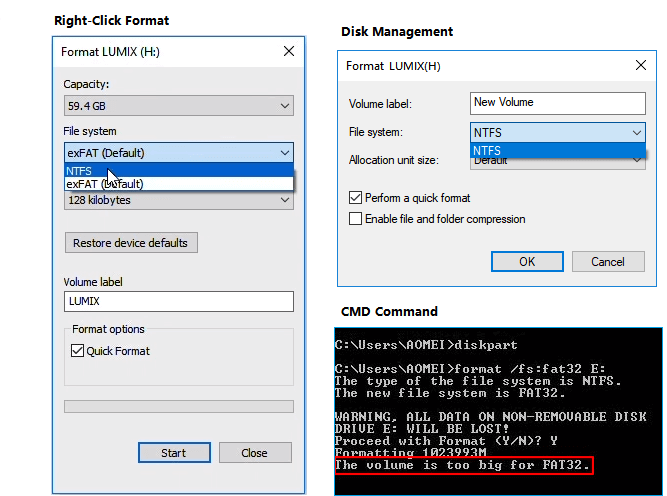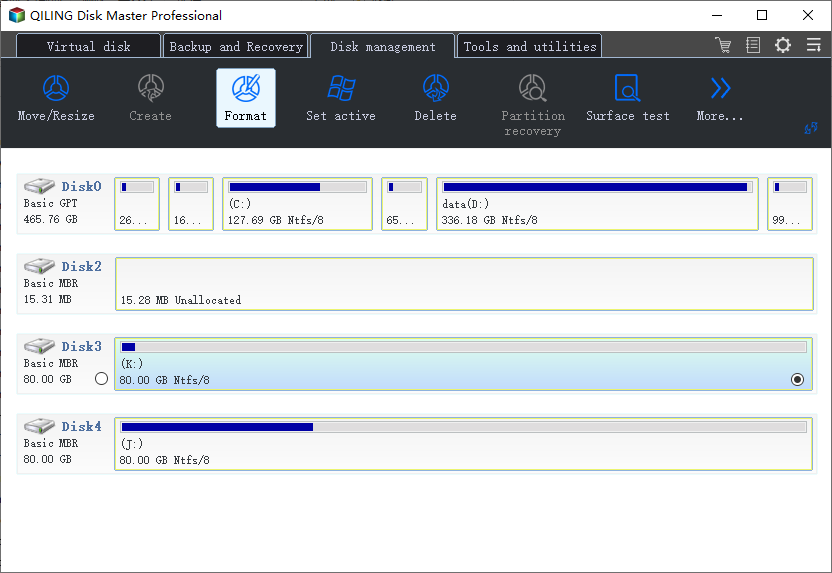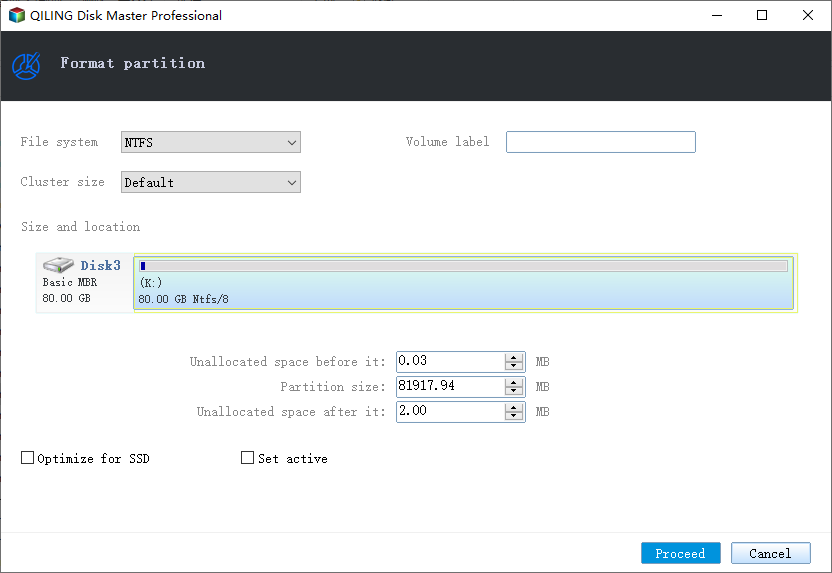How to Format 64GB SD Card/USB Flash Drive to FAT32
You can't format a 64GB SD card to FAT32 using the standard Windows formatting options because FAT32 has a 4GB file size limit. To format a larger SD card to FAT32, you'll need to use a third-party formatting tool that supports larger file systems, such as Rufus or SD Formatter. These tools can format the SD card to a larger file system, like exFAT, which has no file size limit. However, if you need to use FAT32 specifically, you might consider using a smaller SD card.

Why Cannot Format SD Card to FAT32 in Windows 10/8/7
Some SD cards, especially those with 32GB or less storage, are set to FAT32 by default, while larger ones are set to exFAT. However, some devices, like the Nintendo 3Ds, only support FAT32, so users may need to format their larger SD cards to FAT32, regardless of their size.
You can't directly format a 64GB SD card to FAT32 due to FAT32's limitation, which only supports up to 32GB partition size. To work around this, you can create a smaller FAT32 partition on the 64GB SD card, leaving the remaining space as unallocated or using a different file system. This way, you can still use the FAT32 partition for compatibility with older devices or operating systems.
Fortunately, you still have a chance to format your 64GB SD card or USB flash drive to FAT32 even if the Windows built-in utility cannot help. A third-party FAT32 format tool can resolve this issue effectively, providing a powerful solution to your problem.
Full Guide to Format SD Card to FAT32
The SD card format tool can be replaced with Qiling Partition Master, which is a recommended tool for formatting SD cards.
Unlike the Windows built-This software allows formatting storage devices to various file systems, including FAT32, NTFS, ReFS, and others, breaking the limitations of FAT32 on Windows PCs and storage devices, and enabling direct formatting of larger SD cards without affecting storage capacity or read/write speed.
To format your 32GB/64GB/128GB SD card to FAT32, simply connect it to your computer, and you'll be able to easily format it to FAT32.
Step 1. Launch Qiling Partition Master, click the partition you intend to format and choose "Format" in "Disk management" page.

Step 2. In the next window, set the Partition label, File system, and Cluster size for the partition, then click "Proceed".

Once the formatting process is complete, you can safely remove your SD card and use it on other devices, such as gaming consoles or cameras, or even on your Windows or Mac computer without any problems.
If you'd like to resize or partition your SD card, you can follow the steps in the article "How to Partition a Hard Drive in Windows 10" for assistance.
FAT32 vs. NTFS vs. exFAT: Which Is The Best for Your SD Card?
When formatting an SD card using Windows utilities like Disk Management, File Explorer, CMD, or third-party partition managers, you have options beyond FAT32, including NTFS and exFAT. However, choosing the best format for your SD card or USB drive depends on your specific needs. To help you decide, let's briefly compare FAT32, NTFS, and exFAT, and then provide a suitable suggestion for each.
Comparison Among FAT32, NTFS and exFAT
Here is a comparison of FAT32, exFAT, and NTFS in one paragraph:
| Comparison | FAT32 | NTFS | exFAT |
|---|---|---|---|
| Supported OS | Windows 95/2000/XP /7/8.1/8/10 | Windows 10/8/7/XP /Vista/2000 | Windows Vista/7/8 /8.1/10 |
| Max Cluster Size | 64KB | 64KB | 32768KB |
| Max Formatting Capacity | 32GB | 2TB | 16EB |
| Max File Size | 4GB | 256TB | 16EB |
The three popular file systems - NTFS, HFS+, and ext4 - each have their own set of advantages and disadvantages. NTFS excels in terms of security and data integrity, but its complexity makes it less efficient.
Highlights:
- FAT32 is more compatible with other operating systems but less efficient than NTFS. It remains the most widely used file system.
- NTFS is the most modern file system, widely used on system drives by default.
- exFAT is considered a replacement for FAT32, offering better compatibility than NTFS on various devices and operating systems.
Limits:
- The FAT32 file system has a maximum file size of 4 GB and a maximum partition size of 8 TB.
- NTFS: No realistic file-size or partition size limits.
- exFAT: No realistic file-size or partition size limits.
Which File System Should You Choose for SD Card?
To choose a suitable file system for your SD card or USB drive, consider the following suggestions: If you're using a Windows system, use the exFAT file system, which is compatible with both Windows and other operating systems. If you're using a Mac, use the exFAT file system as well, as it's also compatible with macOS. If you're using a Linux system, use the ext4 file system, which is a popular and reliable choice.
FAT32
This product is designed for small storage devices, such as small SD cards, USB drives with 32GB or smaller storage, and gaming storage cards. It can help recover lost data from these devices.
If your SD card storage is smaller than 32GB, and you don't plan to store large files (larger than 4GB for a single file) on the card, FAT32 is the best format.
Whenever you need to convert NTFS to FAT32 on a 64GB SD card or 128GB USB drive, you can apply Qiling Partition Master for assistance.
exFAT
Large SD cards, used in devices such as cellphones, cameras, digital cameras, camcorders, GoPros, and DJI drones, among others, can benefit from this technology.
If you have a large SD card or USB drive (64GB or bigger) or need to store large files (larger than 4GB), exFAT is the recommended file system. Although it's similar to FAT32 in terms of compatibility, it doesn't have storage limitations like FAT32 does.
NTFS
The command `chkdsk /f` is used to check the integrity of the file system and fix any errors found on a Windows hard drive partition, USB drive, or external hard drive. It can be run from the Command Prompt or Windows Explorer.
NTFS is a Windows-If you're using an SD card between your Windows computer and a digital device, using NTFS can provide the best performance. Unlike FAT32 and exFAT, NTFS is a more advanced file system that doesn't have file size or storage size limitations. If you're simply transferring files between devices, NTFS is the way to go. Qiling Partition Master is a tool that can convert FAT32 to NTFS without formatting or losing data.
How to Format SD Card to FAT32 - FAQs
1. Can I format a 64GB SD card to FAT32?
Since the 64GB storage device exceeds the maximum FAT32 capacity limit, Windows File Explorer and Disk Management won't allow formatting to FAT32, but Qiling Partition Master can make it possible.
- Connect the 64GB sd card to your Windows computer
- Click the SD card and choose Format
- Select FAT32 as the file system
2. How do I change from exFAT to FAT32?
- Click on the exFAT partition and choose Delete Volume.
- Click again on the unallocated partition and choose New Simple Volume.
- Follow the wizard to create a new partition and assign the volume as a FAT32partition.
To convert exFAT to NTFS or FAT32, you can use a third-party software or built-in Windows tools. The process involves formatting the drive, which will erase all data on it.
3. Can you format a 128gb SD card to FAT32?
To format a 128GB SD card to FAT32, download Qiling Partition Master, which can efficiently and powerfully format SD cards of any capacity without losing disk storage.
Related Articles
- CHKDSK Not Working in Windows 11/10/8/7? Fix It Now!
- How to Format USB Using CMD in Windows | 2022 Guide
- How to Create Bootable Usb Windows 10
- Free Download 2021 Best Memory Card Format Tool, Format SD Card for Free
- Clone Hard Drive with Paid/Free Cloning Software Windows 10
- 2022 Tutorial: How to Resize C Drive in Windows 10/8/7